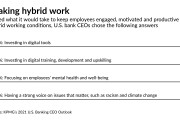Workers at Japanese banks aren't having to rush back to the office, unlike their counterparts on Wall Street, even as the country gradually returns to normal life after the pandemic.
The nation's three largest lenders — Mitsubishi UFJ Financial Group, Sumitomo Mitsui Financial Group and Mizuho Financial Group — said they are allowing more flexibility, eschewing a minimum number of office days per week, as experienced elsewhere.

That marks a contrast with places like New York, where bosses are increasingly expecting workers to
"In Japanese companies, including banks, power is decentralized and teams decide many things at their discretion," said Rikako Onishi, chief executive of Kotora, a Tokyo-based recruitment firm. "I think that's one of the reasons for the difference in attitude toward remote work between Japanese and U.S. banks," she said.
While U.S. banks employ varying approaches, Goldman executives earlier this year emphasized their expectation that staff meeting COVID-protocol requirements
Even as Japan takes its most significant step yet toward
What's more, attendance rates are already high.
Currently, about 60% of those working at MUFG's Tokyo headquarters go to the office, a spokesperson said. For Mizuho, its about 70%.
Mizuho, Japan's third-largest lender, said it is up to each workplace to decide how often employees need to show up at the office. Mizuho started opening satellite offices in suburbs in late 2020, such as the one in Tachikawa, a 40-minute train ride from the bank's headquarters. They are converted from conference rooms in retail branches and other facilities, so that employees can save on commuting hours to downtown Tokyo.
The bank had 21 such locations at the end of September and plans to open more, based on actual usage and employee feedback, according to a spokesperson. Rival banks have also opened satellites.
The core unit of larger rival MUFG sees many wanting to keep remote work as an option, citing commuting as one of the reasons.
Even in the U.S., where they have a presence, there's no uniform policy requiring workers to be in the office, according to spokespeople for both the banks. Like in Japan, the level of in-person presence required depends on the team.
Sumitomo Mitsui's core banking unit also plans to continue a hybrid-work approach, which some employees say is more efficient to take care of family, according to a spokesperson.
For Japan's bankers, work-from-home was almost unheard-of before COVID-19. At the onset of the pandemic, some bank employees had to rely on smartphones due to a shortage of company laptops.
But unlike other major wealthy countries, Japan did not resort to lockdowns even during the height of the virus. Instead, the government asked businesses to curb the number of people working in offices by up to 80%, reinforcing hybrid work as an option.
The banks' hybrid approach has drawn comparisons with Japan's
In recent weeks, life is returning to normal in Tokyo as the daily count of new caseloads falls to nearly one-tenth of the peak period this summer. The country earlier this month ended almost three years of tighter controls that kept most visitors out of the island nation.
Japan's banks add to a group of lenders that are taking a less hardline stance. Every one of 12 top European banks
Bank of America, too, has outlined a
— With assistance from Takaaki Iwabu.






